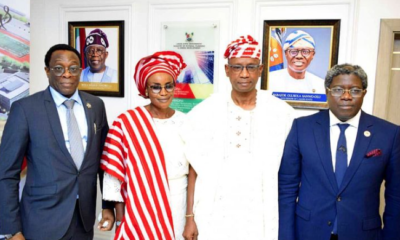Tech
Orange Middle East, Africa, Smart Africa Join Forces To Foster Entrepreneurship, Sustainable Jobs For Youth In Africa


On the sidelines of the Mobile World Congress Africa, taking place in Kigali, the Smart Africa alliance and Orange Middle East and Africa have signed a three-year agreement aimed at supporting the development of the African continent’s digitalization through advocacy, knowledge sharing, and assessment of government digital maturity to accelerate Africa’s digital transformation and the creation of sustainable jobs for Africans.
Orange and Smart Africa are two major institutions, one recognized for its commitment towards digital inclusion and its knowledge in the innovation field, and the other one, empowered by a bold and innovative commitment by African Heads of State to accelerate sustainable socio-economic development on the continent.
Both organizations will collaborate in activities such as training for the youth and women to support their employability in new digital professions.
This will be done through their digital skills development programs namely Smart Africa Digital Academy (SADA) and the Orange Digital Center (ODC) network, present in 16 countries in Africa and the Middle East and 6 European countries.
They will also work together in enhancing innovative entrepreneurship by strengthening incubation, acceleration, and financing capacities for entrepreneurs in priority sectors such as environment, e-agriculture, e-health, e-commerce, etc.
Both the Smart Africa Digital Academy (SADA) and the Orange Digital Center (ODC) are dedicated to offering digital skills training to diverse audiences.
Orange Digital Center (ODC) brings together in the same physical structure a set of free programs open to all, ranging from digital training for young people and support for entrepreneurship to acceleration and investment in startups.
Smart Africa Digital Academy (SADA) is the driving vehicle for implementing Smart Africa’s digital skills initiatives, aiming to empower African citizens to embrace digital transformation and equip them to innovate and compete on a global scale.
Through their programs, the two organizations will work together to encourage the creation of innovative digital solutions to respond to local challenges and thus contribute to the sustainable development of the continent.
Commenting on this agreement, Lacina Koné, CEO of Smart Africa, stated: “Empowering African citizens, young people especially, to equip them for the jobs of the future has been key to our digital transformation efforts. Joining efforts with Orange will expedite our collective efforts in this regard.”
Jérôme Hénique, CEO of Orange Middle East and Africa, added: “This partnership will contribute to the objective shared between Smart Africa and Orange, namely to develop the digital skills of the African youth, especially women, while supporting innovative entrepreneurship. This is part of our commitment to actively contribute to the digital transformation of the continent.”
Tech
NITDA, NIMC Partner To Enhance Digital Public Infrastructure


Nigeria’s National Information Technology Development Agency (NITDA) and the National Identity Management Commission (NIMC) have announced a new collaboration that will see them create a platform for the seamless exchange of data and the strengthening of Digital Public infrastructure across Ministries, Departments and Agencies of government.
Read Also: U.S. Food Firm Leads Coalition To Partner FG on Cassava Export
The Director-General of NITDA, Mr. Kashifu Inuwa who revealed this during a courtesy visit to the Director General of NIMC, Mrs. Bisoye Coker-Odusote in Abuja Nigeria’s Capital, said the collaboration is significant in promoting digital economy initiatives that will lead to a more efficient and effective service delivery to Nigerians.
“Today, we have agreed to set up a technical working crew to look at how we can harmonies and implement national public key infrastructure, how we can work together to build the Nigerian DPI stack, how we can work together on data exchange platform and to strengthen our enterprise Architecture across MDAs to give a 360 view of all government investments in IT,” he said.
Mr. Kashifu said, “The technical working group will start working immediately and We look forward to getting a final working recommendation from them by the end of May. At the end, we should agree on how the National public key infrastructure, (PKI) should look like, the regulatory frame work for it and how we can start using it to secure digital transactions in Nigeria.”
Commenting on the new collaboration, the Director-General of NIMC, Mrs. Bisoye Coker-Odusote said both organizations recognize the immense value in sharing data and the collaboration is a step towards achieving a more digitally enabled Nigeria.
“The key thing is to adopt the stack technology process in Nigeria through the digital public infrastructure. We want to work together with NITDA to produce the PKI and ensure that it is used locally across the public and private sectors,” she said.
“The collaboration is a welcome idea. It is a strategic move towards achieving a harmonized database in the country. The NIN which is a unique identifier is basically the foundational identity on which the digital public infrastructure sits on. It is important that we harmonize together to advance the course of technology in Nigeria. Working with NITDA in this partnership will chat a new course forward,” she further said.
News
Telecom Union Threatens Strike Over Anti-workers’ Practices


A trade union in the telecommunication sector, Private Telecommunications and Communications Senior Staff Association of Nigeria (PTECSSAN) has threatened to down tools over anti-workers activities.
Read Also: Ogun State Inaugurates Health Data Governance Council
The union, which is mobilising the workers for the industrial action has told them to down tools from April 4, 2024.
The union’s general secretary, Comrade Okonu Abdullahi, who spoke yesterday based his call for the strike on the slavery activities employers have subjected the workers to.
Okonu said another reason for the strike is because of the failed efforts by the union and the Federal Ministry of Labour and Employment to resolve the issues, stressing that “the companies have failed to make themselves available for conciliatory meetings.
“It is in the light of this that the leadership of the union is mobilised for strike. Workers, especially the engineers should down tools as from 12am on Thursday, April 4, 2024.
“This decision has become inevitable because the subcontractors, Reime Group, Allstream Streamenergy Solutions Limited, Uppercrest Limited, Tyllium Nigeria Limited and Specific Tools and Techniques Limited where these workers are working for on projects won by Huawei Technologies Nigeria Limited have continued to make life miserable for these workers.
“These workers are working like slaves in their own country with no entitlements commensurate with their efforts paid to them. They are made to work without working hours and risk their lives going to the field in the wee hours of the night without adequate security provided for them.”
He called for immediate recognition of the fundamental right of the employees to freely associate with the Union; recognition of the union as a negotiating body for the employees on workers welfare.
Education
National University of Singapore Launches AI institute


The National University of Singapore launched its artificial intelligence institute on Monday to advance research and the application of AI technologies in education, healthcare, and finance.
Read Also: FG To Ban Importation of Syringe To Boost Local Production
According to a university statement, the new institute would also study ways to safeguard transparency and accountability to address ethical concerns and risks associated with AI.
The institute’s researchers received an external investment of $6 million.
The university would invest an additional $14.8 million for foundational research, policy study, and real-world applications.
The statement added that the institute aimed to collaborate with government agencies and industry to amplify AI capabilities across society.
-



 Entertainment1 year ago
Entertainment1 year agoThe Story Of A Woman With Unusual Long Backside, Sarah Baartman
-



 Entertainment1 year ago
Entertainment1 year agoTallest Man In Nigeria Afeez Agoro Cries Out To Nigerians For Financial Support After Chronic Arthritis Diagnosis As SFCOBA 94Set Pays Him Visit
-



 Business2 years ago
Business2 years agoNigeria Vs Ghana: Authentic Nigeria Football and Allied Sports Supporters Club Seals Sponsorship Deal with 86Z Football Technology Limited Foots
-



 Education2 years ago
Education2 years agoTokunbo Wahab: An uncommon legal eagle soaring daily to a greater place in history
-



 News8 months ago
News8 months agoPhysical Planning Commissioner, Oluyinka Olumide Assumes Office …Harps On Transparency, Zero Tolerance To Building Collapse
-



 Featured1 year ago
Featured1 year agoBuruj Football Club’s Players Moving To Europe Delights Obesere
-



 Sports11 months ago
Sports11 months agoVictor Osimhen Returns To Roots As Football Superstar Visits Primary School And Inspires Young Talent
-



 Featured2 years ago
Featured2 years agoQatar 2022 World Cup Playoff: Black Stars Hold Eagles To Scoreless Draw In Kumasi




